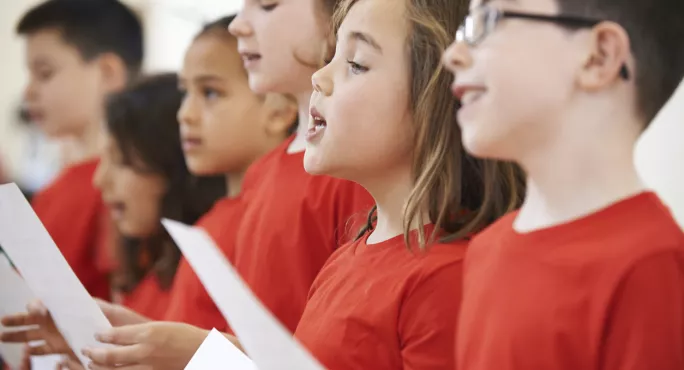‘Impassioned plea’ to teachers to keep pupils singing

Six Norwich primary schools have been working with an opera charity to ensure that pupils are able to sing about their experience during the Covid-19 pandemic.
The schools have worked with the charity Into Opera and the composer Will Todd to develop musical responses to the coronavirus crisis, creating a song cycle about their experience of 2020.
DfE: Schools allowed to move their teachers between ‘bubbles’
Reopenings: ‘Extremely vulnerable’ teachers expected back in school
Guidance: School Covid outbreaks won’t ‘generally’ mean closures
The project has been designed to focus on pupils’ mental health and wellbeing. During lockdown in July, pupils at home or in school took part in virtual workshops producing poetry, letters, journals and artwork as a response to their experiences.
Into Opera’s artistic director, Genevieve Raghu, and performance poet, Adisa the Verbalizer, curated the responses into lyrics, set to music by Mr Todd.
“It’s been incredibly moving to work with the words which the children have shared with us,” Mr Todd said.
Coronavirus: The impact on singing in schools
“Their words are heartfelt, thoughtful, kind, grateful, frustrated, funny, sad and utterly brilliant. I hope the music we’ve created with their words can help them express their thoughts, feelings, fears and hopes as they move forward into the next part of their journey.
“I hope that what these children in Norwich have to say can be an inspiration to everyone who hears them singing these songs.”
The six songs created with the schools form a song cycle titled 2020: You Won’t Hold Me Back! and will receive a virtual premiere on YouTube along with a pre-recorded Q&A with artists and teachers on Thursday 17 December.
“The public response to the pandemic seems to have been dominated by adults and politicians. We’ve not heard very much from children at all. I felt it was important to create an opportunity for children to tell their stories about the impact of the pandemic on their lives, to develop a project which would give children a voice and encourage them to dig deep emotionally,” Ms Raghu said.
The school leaders have reported that taking part in the project has improved pupils’ self-esteem at a challenging time, and have issued an “impassioned plea from our teachers, to teachers across the UK, to encourage them to keep their children singing.”
“So many schools across the UK have stopped singing entirely because of the strict guidelines, so I really hope this project will motivate and inspire teachers across the country to get music back into their schools,” Ms Raghu said.
The schools followed government guidelines while ensuring that pupils can keep singing. Some headteachers have turned their offices into recording studios, or wheeled pianos outside for larger groups to rehearse together.
“The children are so excited that their words, their feelings, their emotions have been put on to paper… it’s not only increased their self-esteem but it’s shown them that their thoughts are valued. It’s made them feel recognised and acknowledge,” Claire Furness, deputy headteacher at St Francis of Assisi Catholic Primary School, said.
“Into Opera has supported us tirelessly to bring this project to fruition. The quality of Into Opera’s work, from the teaching resources, the online workshops, recordings and the songs themselves have been of the highest professional standards,” Sarah Claflin, deputy headteacher at St Michael’s VA Junior School, said.
“As a result of this project, there is a great sense of achievement in the school and so much joy at a time when it could have been very different,” she added.
Government guidance allows pupils to sing but warns of “additional risk of infection”.
It says that “schools should keep any background or accompanying music to levels which do not encourage teachers or other performers to raise their voices unduly”.
“If possible, use microphones to reduce the need for shouting or prolonged periods of loud speaking or singing. If possible, do not share microphones. If they are shared, follow the guidance on handling equipment,” it says.
You need a Tes subscription to read this article
Subscribe now to read this article and get other subscriber-only content:
- Unlimited access to all Tes magazine content
- Exclusive subscriber-only stories
- Award-winning email newsletters
Already a subscriber? Log in
You need a subscription to read this article
Subscribe now to read this article and get other subscriber-only content, including:
- Unlimited access to all Tes magazine content
- Exclusive subscriber-only stories
- Award-winning email newsletters